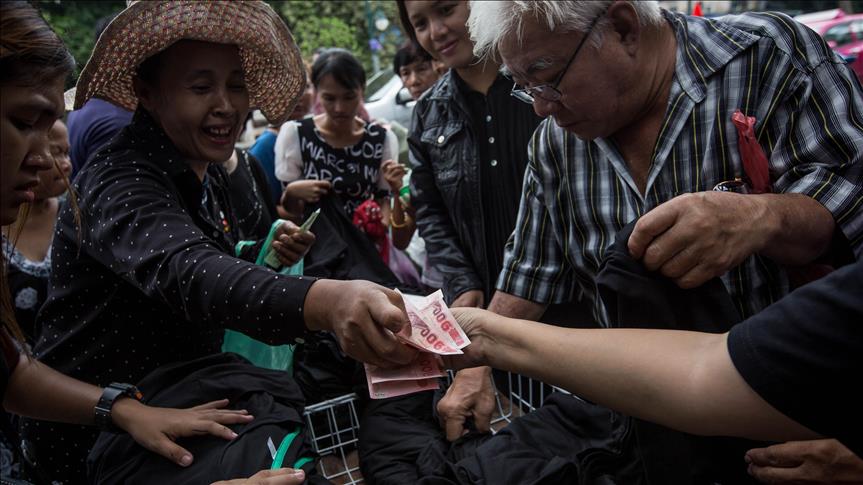Thais shamed for not wearing mourning attire for king
Head of military gov’t calls for unity after reports of Thais not wearing black after king’s death being publicly shamed
 Thai mourners haggle for black clothes at a Bangkok market after the government warns against price gouging for mourning wear following King Bhumibol Adulyadej's death (Photo: Guillaume Payen / Anadolu Agency)
Thai mourners haggle for black clothes at a Bangkok market after the government warns against price gouging for mourning wear following King Bhumibol Adulyadej's death (Photo: Guillaume Payen / Anadolu Agency)
Banghok
By Max Constant and Arun Saronchai
BANGKOK
As hundreds of thousands of people continue to flood public places around Thailand to mourn King Bhumibol Adulyadej, the country's junta chief-cum-prime minister has attempted to contain ill feeling against those deemed to not be following national protocol.
Late Monday night, some 20,000 people were gathered in Bangkok's Sanam Luang area -- a public square in front of the Grand Palace -- wearing the official mourning attire of black or white.
According to local media Monday, people not donning the official attire have been publicly shamed.
“Why is he not wearing black? What is his heart made of? He has no conscience,” reads one comment under a photograph of a man with a red T-shirt eating in a noodle-shop that was posted to the Internet.
The man in the image responded by posting pictures taken earlier of him donning black attire while paying his respects in the royal plaza in front of the Grand Palace where the body of the late king is lying.
On Monday, the military government’s spokesman Gen. Sansern Kaewkamnerd underlined that the premier, Prayuth Chan-ocha, “wants people to understand each other and sympathize with the limits faced by each individual”.
“This should be a time to demonstrate unity. Those who cannot dress in white or black can wear grieving symbols such as black ribbons,” The Bangkok Post quoted him as saying.
The government has declared a one-year period of mourning throughout which civil servants have been asked to wear mourning attire.
Some private companies have followed suit, asking their employees to do the same.
Immediately after the death of the king -- who had been the world’s longest-reigning living monarch and seen as controlling factor in kingdom's turbulent political history -- traders began making brisk business on markets, particularly in sales of black clothes.
Prices for black garments doubled and then tripled, prompting the government to issue a warning Saturday saying that those selling at “inappropriate prices” could face a maximum penalty of seven years in jail and a fine of $4,000.
Some people who were subjected to public criticism for not wearing black said they could not afford to wear mourning clothes every day.
On Monday, Bangkok's Metropolitan Administration factored in the price of paying respect for those traveling from far off provinces, telling reporters that they had prepared several locations to serve as temporary accommodation.
Gyms, homeless shelters and youth centers will be converted to provide lodging for those who could not afford hotels or stay with relatives but still wanted to pay their respect.
According to the Met, around 200,000 mourners per day have visited the Grand Palace since Friday -- when the king's body was moved there.
Not all indiscretions, however, have been taken so lightly.
Following several instances of people clamoring for those suspected of posting "severely offensive" content online to charged with lese-majeste, one woman was hauled from a bungalow on the large island of Koh Samui to a local police station.
According to The Bangkok Post, demonstrators demanded she apologize to the late king's portrait.
The group dispersed after they were told the woman might be charged after she was detained for questioning .
Several foreign embassies have issued travel advice telling their nationals how to behave during the mourning period -- a rule generally followed by most foreigners residing or visiting Thailand, with some exceptions.
Among the exceptions to the “dress respectfully” rule was a Russian TV crew cameraman dressed in a pink shirt and green shorts who was photographed filming a crowd of mourners in front of the Grand Palace the day after the king’s death.
His picture was widely shared on the Internet with critical comments about his “cultural insensitivity”.
Thailand has the harshest lese-majeste law in the world. Section 112 of the Thai criminal code punishes those who “insult, defame or threaten the king, the queen, the heir or the regent” with jail terms between three and 15 years.
In the last ten years, judges have tended to broadly interpret the law, with a man criticizing a 19th century king jailed, along with another who mocked a dog belonging to King Bhumibol on Facebook .








